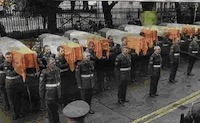
By Jim Gibney (for Irish News)
Standing on the raised plinth at the bottom of Daniel O’Connell’s statue in O’Connell Street in Dublin in October 2001, I had a clear view of the procession behind the coffins of the 10 republican martyrs executed by the British during the War of Independence. Best known of the martyrs was 18-year-old Kevin Barry, hanged in Mountjoy Prison for his part in an IRA operation during which a British soldier was killed. O’Connell Street was thronged with people paying their respects to those from another era in time who gave their young lives so that those on the streets that day could live in a country free from occupation by the British Crown forces.

I noticed row upon row of people in their middle years proudly marching, bearing a medal on their lapel. I was curious. They were too young to have been participants in the Rising or the War of Independence. They were obviously the descendants of those who had been. They were there to acknowledge the sacrifice and to wear the medal of honour posthumously awarded to their relative by an Irish government in recognition of a heroic deed carried out in the name ofthe Irish republic declared on the steps of the GPO on Easter Monday 1916.
The occasion was the reburial by the Irish government - the state’s formal recognition - of a group of martyrs known as the Forgotten 10 who had lain in lime graves in Mountjoy Prison since 1920. My brother Damien and I were fortunate to get close enough to the hearses to touch the nameplates of the martyrs. I remember touching Kevin Barry’s and recalling the words from the song named after him:
Just a lad of 18 summers, Yet there’s no-one can deny, As he walked to death that morning He proudly held his head on high.
For the first time in my adult republican life, on the streets of Dublin, amidst the thousands of people and the state pomp and ceremony I felt part of the Irish nation.
I felt connected to a national ideal long denied to the Irish people the unity and independence of Ireland.
Living in the six counties - in a partitioned country, cut off by force of British arms - had instilled in me a feeling of isolation and resentment towards the Irish government and political establishment which had abandoned northern nationalists after partition.
I knew that this was a widespread feeling among northern nationalists and republicans and is the reason why today they put so much emphasis on the Irish government’s direct involvement in the north’s affairs.
A lot has changed since then especially with the Irish government’s presence in the north through the all-Ireland ministerial council and cross-border bodies.
Over the coming years the sense of really belonging to the Irish nation will get stronger as the political process settles down and begins to tackle and provide solutions to island-wide-related problems.
On public display all this week until Saturday in the Felons’ Club on Belfast’s Falls Road is a very impressive and well-researched exhibition on the history of republicanism in Belfast from 1916 until today.
The exhibition, produced by Belfast’s National Graves Association, captures the spirit and history through photographs, film footage, historical documents and artefacts.
On show for the first time ever are the witness statements recorded from Belfast Irish Republican Brotherhood members involved in the 1916 Rising and War of Independence. This Sunday all over Ireland republicans will gather to honour those from this generation who lost their lives in the struggle for a united Ireland.
At republican plots, large and small, the Proclamation of the Irish Republic will be read out, reminding those gathered of the objectives that have steered republicans for almost a century. It is this revered document that makes the connection through the ages between those who occupied the GPO in Dublin’s O’Connell Street on Easter Monday 1916 and those since who occupy hallowed graves across this nation in the name of the republic.
Like those bearing medals in O’Connell Street, I too,this Sunday,will remember with pride those IRA members I knew who died young so that we could live in a united and free country.
![[Irish Republican News]](https://republican-news.org/graphics/title_gifs/rn.gif)
![[Irish Republican News]](https://republican-news.org/graphics/title_gifs/harp.gif)

